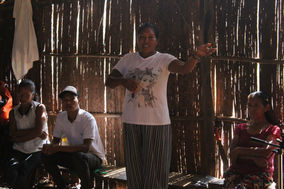The intercultural health model:
Thanks to the struggles for the rights of indigenous peoples in Colombia, their own forms of governance have been recognized, giving indigenous authorities the right to decide on their territories. However, the processes of territorial governance in Mitú, Vaupés, still present multiple challenges. The armed conflict, whose effects on the territory have been little explored and addressed, generates a social and cultural division that has yet to be repaired. Due to this negligence, no effective solutions have been proposed to guarantee the health of the territory, which includes both the ecosystem and the indigenous peoples, under the indigenous cosmovision and the concept coined by the IOM of a single health.
This has generated critical well-being indicators for the region: high rates of gender-based violence, low participation of women and youth in decision-making; the highest suicide rate in the country; the highest prevalence of stunted growth in children under 5 years of age and one of the highest prevalence of anemia and double and triple nutritional burden. Access to basic services is deficient and without a differential approach. Deforestation and the health crisis in Vaupés and the Amazon have generated a catastrophe that could lead to the disappearance of dozens of ethnic groups.
For this reason, in 2018, with the support of FALCK, Sinergias strengthened its efforts to improve access to intercultural health services in rural indigenous communities in Vaupés. In this project, we worked with 18 communities in the Rio Abajo and Carretera regions, reaching approximately 2,000 inhabitants in the municipality of Mitú. Working together with indigenous organizations, community leaders and local health institutions, we developed a three-year plan to strengthen health governance in the communities and improve access to quality intercultural services.
Over the following years, and using all the experience of Sinergias' years of intercultural health work, we co-developed a primary health care model adapted to the culture and specific needs of the population. The model has 10 components that reflect the concept of integral health, understanding that it is related to individual, family and community well-being and balance with the territory. The components are:
-
Strengthening local governance capacities,
-
Family and community health
-
Women's health
-
Mental health
-
Children's health
-
Intercultural approach
-
Health surveillance
-
Prevention and control of neglected tropical infectious diseases
-
Chronic non-communicable diseases
-
Basic health care
Thanks to the support of FALCK, since 2019 the intercultural health care model has been consolidating, which compiles more than 10 years of work in Vaupés.
“Sinergias has done many good things to investigate, so that we don't forget (traditional practices) and we are taking it to our children, 'we have to learn' [...]. If we are organized and rigorous we ourselves will be able to manage our health, with our knowers.”
Rubiela, captain of the Mituseño community Urania.
Life plans and territorial governance:
Life plans are the planning instruments used by indigenous authorities at the territorial level to guide their socio-organizational model and autonomous territorial development, based on the knowledge and practices of each cosmogony and culture. The plans are a fundamental tool for administrative processes and for dialogue with other state and institutional territorial planning mechanisms.
Recognizing the importance of having strong life plans, Sinergias has focused its accompaniment to two indigenous authorities to design, update and implement these policy planning tools. With the Asociación de Autoridades Tradicionales Indígenas Aledañas a Mitú (AATIAM) and the Asociación de Autoridades Tradicionales Aledañas a la Carretera (AATAC) we are working to generate strong leadership processes, identifying challenges and resources to address the former and enhance the latter.





%20(1).png)
























